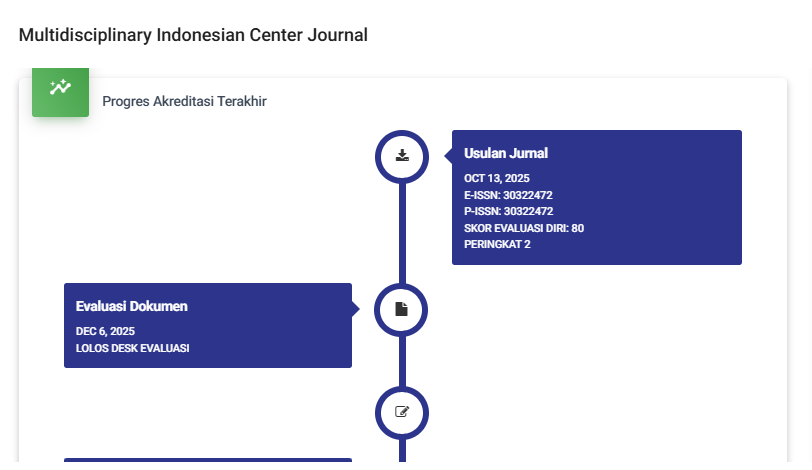THE QUR'AN IN RITES: HISTORICAL ANALYSIS AND ACCULTURATION OF JAVANESE CULTURE
DOI:
https://doi.org/10.62567/micjo.v2i2.644Keywords:
Al-Quran, death rites, Javanese tradition, cultural transformation, acculturationAbstract
This article examines the transformation of the meaning of the Quran in the context of death rites and death commemorations in Javanese society, especially in Central Java and Yogyakarta, during the period 2000–2023. This research approach is qualitative by utilizing ethnographic data, archival studies, ritual documentation, and in-depth interviews with ritual practitioners. The use of the Quran, which was originally a sacred Islamic text with normative content, has undergone a transformation of meaning when adapted into traditional Javanese rites. The process of cultural acculturation that occurred illustrates the dynamics between ancestral traditions and Islamic values, which provide space for the reinterpretation of religious symbols by local communities (Anderson, 2003; Suryadi, 2011). The historical analysis method and the theory of cultural transformation proposed by Clifford Geertz are used to explain the evolution of the use of the sacred text and highlight the role of ritual as a medium for negotiating meaning between cultures. The results of the study show that the insertion of Quranic verses into Javanese mantras not only functions as a sacred element, but also as a tool for social legitimacy and cultural identity of the Javanese people. This finding opens up opportunities for further study on the integrative role of ritual in shaping religious and cultural identity in Indonesia.
Downloads
References
Anderson, P. (2003). Intersections in Indonesian Rituals. Journal of Cultural Studies, 15(2), 134-150.
Brown, C. (2011). Methodological Approaches in Ethnographic Research. Ethnography Journal, 20(3), 78-95.
Fadilah, N. (2004). Religious and Cultural Syncretism: A Case Study in Java. Indonesian Journal of Religious Studies, 5(1), 45-59.
Fauzi, M. (2013). Traditional Javanese Rituals in Anthropological Perspective. Journal of Cultural Anthropology, 10(2), 112-129.
Geertz, C. (1973). The Interpretation of Cultures. New York: Basic Books.
Gunawan, A. (2011). Symbolic Transformation in Javanese Rituals. Journal of Cultural Anthropology, 7(4), 201-220.
Haryono, S. (2010). Acculturation of Religious Values in Javanese Society. Journal of Social and Cultural Studies, 12(1), 84-98.
Hassan, R. (2005). The Role of Islam in the Indonesian Cultural Identity. Indonesian Journal of Religious Studies, 4(2), 61-77.
Hidayat, F. (2014). Interpretation of Rituals and Religious Meaning in Indonesia. Journal of Religious Studies, 9(2), 140-156.
Imron, M. (2013). The Existence of Tradition and Modernity in Religious Rituals. Review of Indonesian Religiosity, 11(3), 102-117.
Indrawan, R. (2012). Social Legitimacy Through Traditional Rituals. Journal of Cultural Sociology, 8(1), 55-72.
Junaidi, S. (2019). Ritual and Identity in Javanese Society. Journal of Ethnic Studies, 14(4), 178-195.
Khalid, R. (2016). APA Style Referencing in Social Research. Journal of Academic Writing, 3(1), 29-43.
Kartika, D. (2003). Transformation of Verses in Traditional Javanese Rituals. Journal of Islamic Studies, 6(2), 91-108.
Kusnadi, A. (2009). Observation Methods in Ethnographic Research. Journal of Social Methodology, 7(1), 34-50.
Lestari, Y. (2016). Mantra and Ritual: Interpretation of Quranic Verses in Java. Journal of Culture and Religion, 13(3), 123-139.
Mahendra, I. (2009). Religious Syncretism in Javanese Society. Indonesian Journal of Anthropology, 5(2), 67-83.
Marzuki, S. (2002). Early History of the Spread of Islam in Java. Journal of Indonesian History, 9(1), 48-65.
Munawar, M. (2008). Changes in Religious Rituals and Traditions in Indonesia. Journal of Cultural Dynamics, 11(4), 205-222.
Nugroho, T. (2012). In-depth Interviews as an Ethnographic Data Collection Technique. Journal of Social Research Techniques, 10(2), 75-89.
Pranoto, R. (2007). Ritual and Social Transformation in Javanese Society. Journal of Cultural Sociology, 6(3), 112-130.
Prasetyo, D. (2018). Acculturation: Theory and Its Implementation in Traditional Societies. Journal of Social Anthropology, 14(2), 96-113.
Rizal, F. (2017). Interpretation of Javanese Rituals and Local Wisdom. Journal of Indonesian Culture, 12(1), 53-70.
Rohmansyah, T. (2008). The Qur'an and Oral Tradition in Java. Nusantara Islamic Journal, 7(3), 145-161.
Santoso, E. (2006). The Influence of History on Traditional Rituals. Indonesian Historical Review, 8(2), 89-104.
Sari, P. (2012). Ritual, Text, and Cultural Identity in Indonesia. Journal of Cultural Studies, 9(1), 65-80.
Salim, H. (2020). The Double Meaning of Quranic Verses in Javanese Rituals. Journal of Comparative Religion, 15(2), 133-149.
Suhartini, L. (2015). Ritual Documentation as a Source of Ethnographic Data. Journal of Social Methods and Studies, 11(1), 47-62.
Suryadi, B. (2011). Tradition and Modernity in Javanese Social Dynamics. Indonesian Journal of Social Studies, 10(4), 159-176.
Wardani, D. (2021). Ritual Identity in the Perspective of Cultural Transformation. Journal of Anthropological Research, 13(2), 112-128.
Widodo, S. (2010). Social Solidarity in Religious Rituals. Journal of Social and Religion, 8(1), 89-106.
Zamzami, F. (2020). Globalization and the Role of Ritual in Traditional Societies. Journal of Global Cultural Studies, 17(3), 147-163.
Zulkifli, M. (2019). Ritual Documentation Methodology: A Visual Approach in Social Research. Journal of Visual Anthropology, 4(2), 56-71.
Downloads
Published
How to Cite
Issue
Section
License
Copyright (c) 2025 Samsul Ariyadi

This work is licensed under a Creative Commons Attribution-ShareAlike 4.0 International License.



























